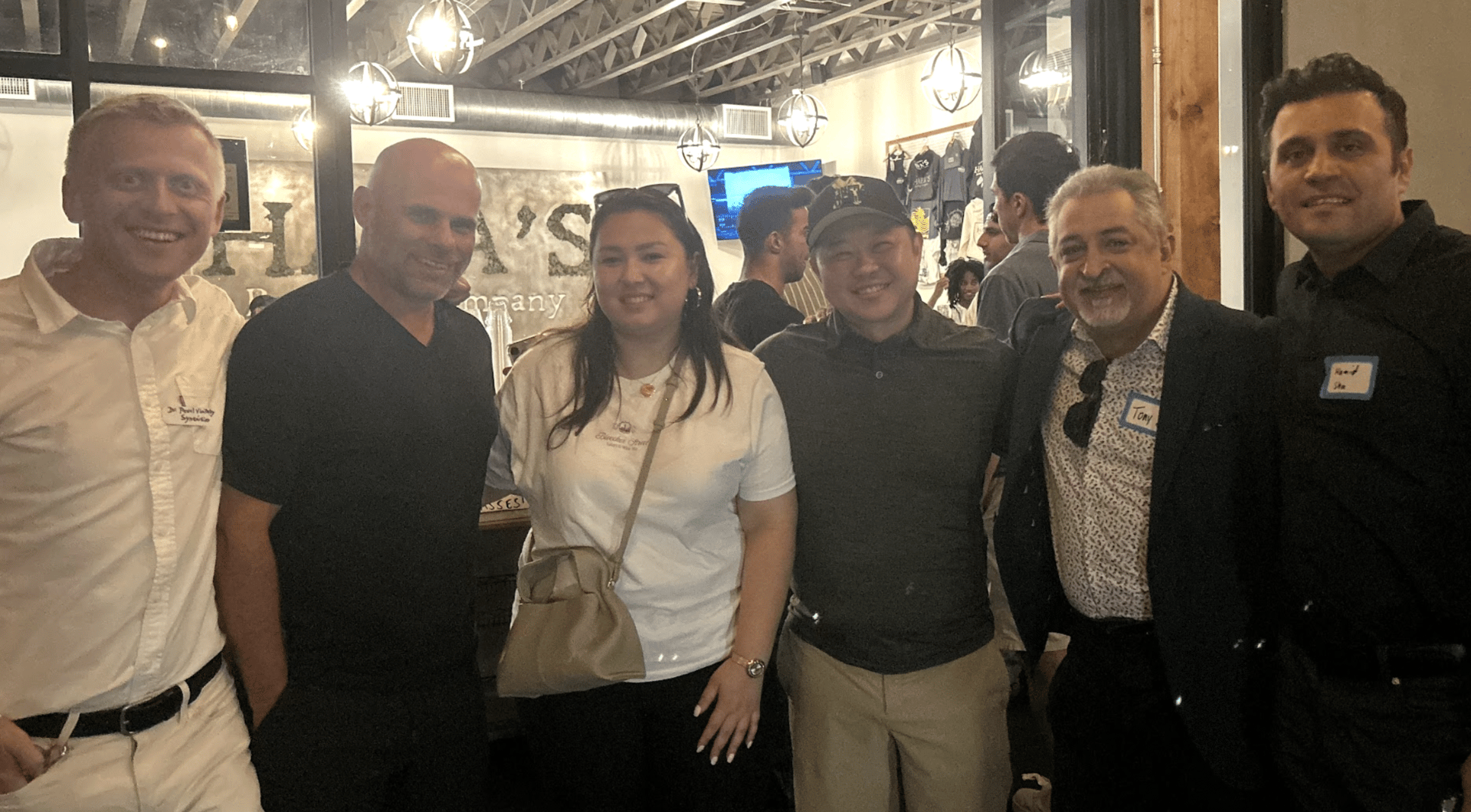- Valley Recap
- Posts
- So That's Price of Doing Business with China 💵 BA Startups Raised 💰$1.9B This Week
So That's Price of Doing Business with China 💵 BA Startups Raised 💰$1.9B This Week


U.S. President Donald Trump and Nvidia CEO Jensen Huang, speaking at the White House on April 30, 2025, in Washington, D.C.
Trump’s Nvidia–AMD Chip Deal: A Turning Point for Export Controls and AI Investment
The Trump administration’s unexpected deal permitting Nvidia and AMD to resume AI chip sales to China, in exchange for a 15% revenue share, marks a fundamental shift in U.S. technology policy. For years, restricting advanced semiconductor exports was framed as a non-negotiable pillar of American national security. This abrupt reversal throws into question whether Washington now believes its technological lead is insurmountable or if policy is simply becoming transactional.
Undercutting the National Security Rationale
Historically, U.S. export controls were justified by the argument that advanced chips, especially those powering large AI models, posed an existential risk if made available to adversaries such as China. Bipartisan support centered on keeping cutting-edge GPU hardware out of Chinese hands, not just for commercial advantage but to delay Beijing’s deployment of powerful AI with military or surveillance implications. The sense of urgency was clear: slow China down, buy time for the U.S. to stay ahead.
Trump’s new deal tosses cold water on that logic. The arrangement allows Nvidia and AMD previously blocked from China’s massive AI market to sell specific, “watered-down” H20 (Nvidia) and MI308 (AMD) chips, designed to comply with existing rules, in return for U.S. government revenue. The official defense is that China gets “fourth-best” chips, ones Trump called “essentially old,” maintaining a competitive gap. But even limited hardware could still help China close the AI gap incrementally, a concern long raised by security experts.
This flexibility suggests either greater U.S. confidence in its AI dominance or that economic incentives have begun overshadowing security concerns. Trump’s justification echoed personal negotiation style, even claiming he initially demanded a 20% cut but settled for 15% after direct talks with Nvidia’s CEO. While novel, this pay-for-access model rattles the sanctity of export controls and may erode their credibility at home and among U.S. allies.

Legal and Policy Precedents
The agreement is legally ambiguous. Previous export regimes were guided by law and international agreements, not direct revenue sharing. Legal experts caution that this structure might test the boundaries of executive authority regarding tariffs and licensing fees. More concerning is the precedent: if Nvidia and AMD can buy export approval, what stops other industries from negotiating similar terms? This shift threatens to turn critical national security policies into flexible, negotiable and potentially profitable barriers.
Industry Impact: Practicality over Principle
For Nvidia and AMD, the calculus is clear. Reentering China at an 85% net revenue rate is preferable to zero access, given their prior billion-dollar losses from restrictions. Nvidia, especially, has lobbied that a full ban would let Chinese competitors like Huawei dominate, reinvesting profits to catch up technologically. As Bernstein’s Stacy Rasgon said: "Keeping 85% is better than zero percent.” However, this opens the door for U.S. controls to be seen as temporary or negotiable hurdles, rather than effective blockades on adversaries.
Investor Takeaways: Upside and Risk
For investors in AI and datacenter infrastructure, the deal immediately reduces uncertainty for Nvidia and AMD. Renewed Chinese market access, even at a reduced margin, should bolster earnings, boost production utilization, and improve guidance across the supply chain. Chip suppliers and hyperscale datacenter operators also stand to benefit from steadier hardware flows. Analysts expect this to boost valuations across various AI-related tech sectors.
However, the deal introduces a new geopolitical risk variable. If such arrangements can be negotiated and potentially unwound by a future administration regulatory and political unpredictability must be modeled differently.
"This removes a major overhang for AI-related tech stocks. Investors can breathe a sigh of relief that China sales aren’t completely off the table, but at the same time, there remains a wild card if geopolitics or a change in administration reverses course." - Dan Ives of Webbush.
Short-term, companies gain revenue and clarity; long-term, the durability of such “pay-for-access” approaches remains uncertain, raising the prospect of abrupt reversals if the U.S. perceives China’s progress as a renewed threat.
Strategic Shift
Ultimately, the deal reframes the export control debate.
Instead of simply asking, “Can China catch up?” the conversation now becomes, “How much are we willing to sell them, for what price?” Both policymakers and investors will need to adjust their strategies accordingly in this new era of flexible, revenue-driven tech policy.


On Tuesday, August 12, we hosted INFRA SOCIAL #2 to kick off the new season—and it couldn't have gone better. After a summer filled with travel, rest, and recharging, it was wonderful to reconnect with familiar faces and meet brand-new ones.
The evening was alive with laughter, flowing conversations, and the kind of energy that only comes from gathering with people who share a common purpose: to connect, collaborate, and drive the industry forward. Whether we were catching up with old friends or meeting fresh voices full of exciting ideas, the vibe captured exactly what makes these socials special.

This community thrives not just on networking, but on genuine curiosity, learning, and collaboration. That spirit is the heartbeat of INFRA SOCIAL and it’s what gives our season such strong momentum.
✨ A huge thank you to everyone who came out and made the night memorable. Your presence and energy set the tone for what is shaping up to be an incredible season ahead. 🚀
📸 Relive the night through the photo gallery here: INFRA SOCIAL #2 by IGNITEGTM · Wednesday, Aug 13 📸
We can't wait to see you at the next one—stay tuned for details!

Upcoming Events
StepSF 2025 | CXO AI for FSI |

BA Startups Collectively Secured $1.9B this week
Fewer fundings but several large deals brought the Bay Area funding total this week to just over $1.9B with Cognition, Periodic Labs and Retro Biosciences at the top of the list.
IPO Watch – continuing good news for investors, LPs and startups – the companies that took the plunge onto the public markets in 2025 have (mostly) done well, with AI infrastructure companies doing best. The one exception has been Cloudastructure, a Sacramento-area company that chose to do a direct IPO (not a good choice unless you're as well-known as Slack, the last successful direct IPO).
For startups raising capital: The Pulse of the Valley weekday newsletter keeps you current with the startups that are getting funded and who's investing in them – and not just the big, high profile deals. We surface the 50% of early stage fundings that close quietly and never hit the press. Details include investor and executive connections and contact information on 20+ years of fundings and business activity. Founders get the full $50/month package for just $7/month with LinkSV's Entrepreneur membership, details and signup here.
Follow us on LinkedIn to stay on top of what's happening in 2025 in startup fundings, M&A and IPOs, VC fundraising plus new executive hires & investor moves.
Early Stage:
Retro Biosciences closed a $1000M Series A, develops therapies for diseases driven by the biology of aging. We focus on cellular reprogramming and autophagy to rejuvenate cell and tissue function with the ultimate aim of adding 10 years to healthy human lifespan.
Periodic Labs closed a $200M Seed, a stealth-mode artificial intelligence startup focused on materials science.
Tahoe Therapeutics closed a $30M Series A, Tahoe Therapeutics is building AI-powered models of the human cell to design better drugs for more patients.
Parallel Web Systems closed a $30M Seed, creating the interfaces, infrastructure, and economic models for AI agents to thrive on the open web, including innovations across crawling, indexing, ranking, retrieval, and reasoning systems.
Refold closed a $6.5M Seed, an AI-native integration platform that turns enterprise connectivity from a services bottleneck into a software superpower.
Growth Stage:
Cognition AI closed a $500M Series C, an applied AI lab building end-to-end software agents that are collaborative AI teammates.
Squint closed a $40M Series B, a Manufacturing Intelligence Platform that the world's leading manufacturers use to capture expert knowledge, unlock operator performance, and analyze production insights.
Hyphen closed a $25M Series B, Hyphen automates digital order production for food-service, producing over 350 meals an hour while eliminating order defects and cross-contamination.
Mesh Connect closed a $5.5M Series B, building the first global crypto payments network, connecting hundreds of exchanges, wallets, and financial services platforms to enable seamless digital asset payments and conversions.
Celestial AI closed a $5M Series C, the creator of the Photonic Fabric, an optical interconnect technology platform for AI computing systems.

Arista Networks | Cloud Networking, Simplified
Arista builds cloud-grade networking for AI, enterprise, and service providers. Its EOS® software and cloud-first platforms deliver high performance, open automation, and rock-solid reliability across data centers, campuses, and WAN.
What they offer
Switching & Routing: High-density 400/800G data center switches and modern routing for DC, campus, and WAN.
CloudVision®: Single pane for automation, telemetry, and compliance across multi-cloud and on-prem.
AI Networking: Fabric designs and visibility for GPU clusters and large-scale AI training/inference.
Campus & WLAN: Unified wired/wireless with identity, segmentation, and zero-touch ops.
Security & NDR: Inline segmentation and network detection/response with deep EOS telemetry.
NetOps & Automation: Open APIs, programmability, and pipeline-friendly workflows.

Why it matters
Performance at scale: Deterministic low latency and lossless fabrics for mission-critical workloads.
Operational simplicity: One OS (EOS) and one controller (CloudVision) to standardize operations.
Open ecosystem: Integrates with leading orchestration, observability, and security stacks.
Who uses Arista
Cloud operators, AI platforms, large enterprises, and service providers running high-throughput data centers, modern campuses, and high-availability WANs.
📍 Learn more: arista.com | Products, docs, and demos available on site
Your Feedback Matters!
Our mission is to provide an insider's view of Silicon Valley's undercurrents – insights often overlooked by mainstream sources. While many newsletters offer broad market overviews, we focus on delivering a unique, in-depth understanding of the local ecosystem. We share behind-the-scenes conversations, introduce key players we meet at events, and offer exclusive insights.
Your feedback is crucial in helping us refine our content and maintain the newsletter's value for you and your fellow readers. We welcome your suggestions on how we can improve our offering. [email protected]
Logan Lemery
Head of Content // Team Ignite
Big investors are buying this “unlisted” stock
When the founder who sold his last company to Zillow for $120M starts a new venture, people notice. That’s why the same VCs who backed Uber, Venmo, and eBay also invested in Pacaso.
Disrupting the real estate industry once again, Pacaso’s streamlined platform offers co-ownership of premier properties, revamping the $1.3T vacation home market.
And it works. By handing keys to 2,000+ happy homeowners, Pacaso has already made $110M+ in gross profits in their operating history.
Now, after 41% YoY gross profit growth last year alone, they recently reserved the Nasdaq ticker PCSO.
Paid advertisement for Pacaso’s Regulation A offering. Read the offering circular at invest.pacaso.com. Reserving a ticker symbol is not a guarantee that the company will go public. Listing on the NASDAQ is subject to approvals.








